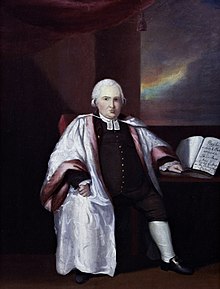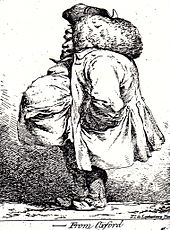Philip Hayes
Philip Hayes ( baptized April 17, 1738 in Oxford , † March 19, 1797 in London ) was an English composer , organist , singer and conductor .
Life
His early musical training was overseen by his father, the composer William Hayes . For his Masque Telemachus he was awarded the title of B.Mus. excellent. In 1777 he obtained a doctorate. He sang in London's Chapel Royal from 1767, but returned to Oxford in 1776 to accept the position of organist at New College and to assist his ailing father, whose successor he became professor of music in 1777. He also replaced him as organist at Magdalen College and the University Church . 1790 was added the position as organist at St John's College . His “lectures” as a professor consisted of specially composed odes and oratorios that were performed at the Oxford Music School. In 1780 he became director of the Festival of the Sons of the Clergy , held at St Paul's Cathedral , and in 1791 he presided over Joseph Haydn's visit to Oxford. As a conductor, he was one of the first British musicians to use a rolled sheet of paper to beat the beat. But he was best known for his troubled personality and corpulence. His regular trips to London in a stagecoach did not go unnoticed by mockers in Oxford, who soon invented the nickname Fill Chaise for Phil Hayes - as he was commonly called - "Carriage filler". Philippe Jacques de Loutherbourg drew a caricature of him in 1790, which was simply signed --- From Oxford .
Hayes' musical language combined respect for late Baroque forms, as practiced by composers such as Georg Friedrich Handel , with a clear understanding of early classical styles. He was also interested in the music of earlier generations - especially Henry Purcell and his contemporaries - and greatly expanded the music library he had inherited from his father. His works show an inventive approach to instrumentation: from 1763 onwards he regularly used clarinets , and his six concertos for keyboard instruments (1769) were the first works published in England to offer the possibility of performance on early pianos . After his death, the unpublished manuscripts of his compositions, along with the works of his father, were given to the Bodleian Library in Oxford.
reception
Hayes' four-part canon By the Waters of Babylon on the text of Psalm 137 KJV provided the template for the three-part canon, which was initially edited by Lee Hays under the title Psalm 137 for the Weavers and later by Don McLean under the title Babylon on his Album American Pie (1971) was recorded. The same canon is also used as the "peace canon" on the German text After this earth there would be none ("Song against the neutron bomb ") sung by Gerd Kern from the GDR song group Oktoberklub . This version of the text became popular in West Germany from the beginning of the 1980s through the peace movement .
Important published works
- Six concertos. 'for the Organ, Harpsichord or Forte-Piano', London 1769.
- Six Sonatas. 'for Harpsichord or Pianoforte with an accompaniment for Violin', op. 2, London 1774.
- The Muses Delight. Catches, Glees, Canzonets and Canons. London 1786 ( archive.org )
- Sixteen Psalms. Oxford, 1788.
- Catches and Glees: The Muses Tribute to Beauty. London, 1789.
- Eight Anthems. Oxford, 1803.
- over 20 songs, published separately between 1769 and 1794
Discography
- Organ Concerto No. 2 in B flat, Stephen Farr, London Bach Consort, 1995, (Meridian CDE 84295)
- Piano Concerto No. 4 in A major, Paul Nicholson, Parley of Instruments, 1993, (Hyperion: Helios CDH55341)
- Piano Concerto No. 4 in A Major, David Owen Norris, Sonnerie, 2002, (Avie AV0014)
literature
- Simon Heighes: The Lives and Works of William and Philip Hayes. Garland Press, New York NY et al. a. 1995, ISBN 0-8153-2357-3 .
- Watkins Shaw: The Succession of Organists of the Chapel Royal and the Cathedrals of England and Wales from c. 1538. Also of the Organists of the Collegiate Churches of Westminster and Windsor, certain Academic Choral Foundations, and the Cathedrals of Armagh and Dublin. Clarendon Press, Oxford 1991, ISBN 0-19-816175-1 .
Web links
- Works by and about Philip Hayes in the catalog of the German National Library
- Sheet music and audio files by Philip Hayes in the International Music Score Library Project
- Sheet music in the public domain by Philip Hayes in the Choral Public Domain Library - ChoralWiki (English)
- Philip Hayes Hyperion Records
Individual evidence
- ↑ Philip Hayes: The Muses Delight: Catches, Glees, Canzonets and Canons. Harrison & Co., London, 1786, p. 105 ( Text Archive - Internet Archive ).
- ↑ Video on YouTube
- ^ Joseph E. Burns: A long, long time ago. A lyrical interpretation. In: Raymond I. Schuck, Ray Schuck (Eds.): Do You Believe in Rock and Roll ?: Essays on Don McLean's "American Pie". McFarland, Jefferson NC 2012, ISBN 978-0-7864-7105-8 , p. 30 ( limited preview in Google Book Search)
- ^ Siegfried wing (ed.): New songs sounding. 10th episode: songs of the singing movement: pioneer, youth u. Folk songs in new movements. VEB Volk und Wissen, Berlin 1981, DNB 354335189 , p. 14.
- ↑ After this earth there would be no In: The song box. Retrieved July 1, 2017.
- ↑ October Club - After This Earth on YouTube
- ^ Karl Adamek : Songs of the Labor Movement. Book guild Gutenberg, Frankfurt am Main 1981, ISBN 3-7632-2563-3 , p. 76.
- ↑ Martin Ketels, Sanna Dinse (ed.): Liederkorb (= songbook 5). Bund, Cologne 1983, ISBN 3-7663-1018-6 , no.36 .
- ^ Peace Education and Music Lessons - Attempts at Orientation. from: Die Grünen Hefte, 30/1991, pp. 25–31.
- ↑ Bettina Alberti: Seelische Trümmer: Born in the 50s and 60s: The post-war generation in the shadow of the war trauma. Kösel-Verlag, Munich 2010, ISBN 978-3-641-04845-7 ( limited preview in the Google book search.
| personal data | |
|---|---|
| SURNAME | Hayes, Philip |
| ALTERNATIVE NAMES | Hayes, Phil |
| BRIEF DESCRIPTION | English composer, organist, singer and conductor |
| DATE OF BIRTH | baptized April 17, 1738 |
| PLACE OF BIRTH | Oxford |
| DATE OF DEATH | March 19, 1797 |
| Place of death | London |

